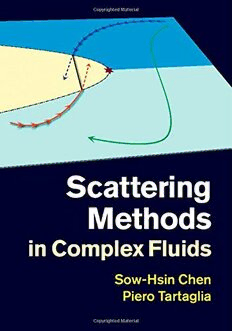
Scattering Methods in Complex Fluids PDF
Preview Scattering Methods in Complex Fluids
SCATTERING METHODS IN COMPLEX FLUIDS Summarising recent research on the physics of complex liquids, this in-depth analysis examines the topic of complex liquids from a modern perspective, addressingexperimental,computationalandtheoreticalaspectsofthefield. Selecting only the most interesting contemporary developments in this rich fieldofresearch,theauthorspresentmultipleexamplesincludingaggregation,gel formationandglasstransition,insystemsundergoingpercolation,atcriticality,or insupercooledstates.Connectingexperimentsandsimulationwithkeytheoretical principles, and covering numerous systems including micelles, microemulsions, biologicalsystemsandcementpastes,thisuniquetextisaninvaluableresourcefor graduatestudentsandresearcherslookingtoexploreandunderstandtheexpanding fieldofcomplexfluids. SOW-HSIN CHEN is Professor Emeritus of Applied Radiation Physics, DepartmentofNuclearScienceandEngineering,MassachusettsInstituteofTech- nology, specialising in the dynamics of soft condensed matter using thermal neutron,synchrotronX-rayandlaserlightspectroscopymethods. PIERO TARTAGLIA is a retired Professor of Physics, Department of Physics, University of Rome ‘La Sapienza’ and a former member of the Scientific Committee and the Physical Committee of the Italian National Research Coun- cil. His research focuses on the dynamic properties of complex liquids and liquid systems. SCATTERING METHODS IN COMPLEX FLUIDS SOW-HSIN CHEN DepartmentofNuclearScienceandEngineering MassachusettsInstituteofTechnology PIERO TARTAGLIA DipartimentodiFisica UniversitàdiRoma‘LaSapienza’ UniversityPrintingHouse,CambridgeCB28BS,UnitedKingdom CambridgeUniversityPressispartoftheUniversityofCambridge. ItfurtherstheUniversity’smissionbydisseminatingknowledgeinthepursuitof education,learningandresearchatthehighestinternationallevelsofexcellence. www.cambridge.org Informationonthistitle:www.cambridge.org/9780521883801 (cid:2)c CambridgeUniversityPress2015 Thispublicationisincopyright.Subjecttostatutoryexception andtotheprovisionsofrelevantcollectivelicensingagreements, noreproductionofanypartmaytakeplacewithoutthewritten permissionofCambridgeUniversityPress. Firstpublished2015 PrintedintheUnitedKingdombyTJInternationalLtd.,Padstow,Cornwall AcataloguerecordforthispublicationisavailablefromtheBritishLibrary LibraryofCongressCataloguinginPublicationdata Chen,Sow-Hsin,1935–author. Scatteringmethodsincomplexfluids:selectedtopics/Sow-HsinChen (DepartmentofNuclearScienceandEngineering,MassachusettsInstituteofTechnology), PieroTartaglia(DipartimentodiFisica,UniversitàdegliStudidiRoma‘LaSapienza’,Italy). pages cm Includesbibliographicalreferences. ISBN978-0-521-88380-1 1. Complexfluids. 2. Scattering(Physics) I. Tartaglia,Piero, 1942-author. II. Title. QD549.2.C66C44 2015 530.4(cid:3)2–dc23 2014035058 ISBN978-0-521-88380-1Hardback CambridgeUniversityPresshasnoresponsibilityforthepersistenceoraccuracy ofURLsforexternalorthird-partyinternetwebsitesreferredtointhispublication, anddoesnotguaranteethatanycontentonsuchwebsitesis,orwillremain, accurateorappropriate. Contents Listofillustrations pageix Preface xv PartI Scatteringandliquids 1 1 Scatteringtechniquesfortheliquidstate 3 1.1 Introduction 3 1.2 Module–Smallangleneutronscattering 28 2 Statisticalmechanicsoftheliquidstate 48 2.1 Paircorrelationsandstructurefactorsinliquids 49 2.2 TheOrnstein–Zernikeequationanditsapproximatesolutions 66 2.3 Theoriesofmacroionsolutions 80 3 Aggregationandclusterformation 88 3.1 Introduction 88 3.2 Module–Reactioncontrolledaggregationofcolloidalparticles 92 3.3 Module–Diffusioncontrolledirreversibleaggregationand supramolecularordering 101 3.4 Module–Percolationinmicroemulsions 109 3.5 Module–Criticalsupramolecularsystems 114 PartII Structuralarrest 125 4 Thetheoryofslowdynamicsinsupercooledcolloidalsolutions 127 4.1 Introduction 127 4.2 Module–Themode-couplingtheoryofsupercooledliquids 131 4.3 Module–MCTforrepulsiveandattractiveglasses 139 4.4 Module–Clusteringinsystemswithcompetinginteractions 151 v vi Contents 5 Experimentsonstructuralarrest 157 5.1 Introduction 157 5.2 Module–ExperimentsontheglasstransitioninPMMA 158 5.3 Module–Copolymersolutionsandhigher-ordersingularities 160 5.4 Module–Theglass–glasstransition 166 6 Modelsofgel-formingcolloids 179 6.1 Introduction 179 6.2 Module–Limitedvalencemodels 182 6.3 Module–PatchycolloidsandWertheimtheory 184 6.4 Module–Gel-formingcolloidsandnetworkglassformers 194 PartIII Water 209 7 Dynamiccrossoverphenomenainconfinedwater 211 7.1 Introductoryremarksonconfinedwater 211 7.2 Module–Modelforwater’ssingle-particle dynamics–relaxingcagemodel(RCM) 224 7.3 Module–Dynamiccrossoverinhydrationwaterof biomaterials 228 7.4 Module–Dynamiccrossoverinhydrationwaterof cementpastes 249 7.5 Module–Dynamiccrossoverinconfinedwaterandits relationtothesecondcriticalpointofwater 252 7.6 Module–Densitymeasurementofconfinedwater inMCM-41S 258 8 Dynamiccrossoverphenomenainotherglass-formingliquids 274 8.1 Introduction 274 8.2 AbsenceofstructuralarrestatT 281 g 8.3 FractionalStokes–Einsteinrelation 283 9 Inelasticneutronscatteringinwater 286 9.1 Introductionto Q-dependentdensityof statesG (Q,ω)ofwater 286 S 9.2 Densityofstatemeasurementsofwater:aplausible evidencefortheexistenceofaliquid–liquidphase transitioninlow-temperaturewater 293 9.3 Measuringbosonpeakasameanstoexplorethe existenceoftheliquid–liquidtransitionindeeply cooledconfinedwater 301 Contents vii 10 Introductiontohigh-resolutioninelasticX-rayscattering spectroscopy 309 10.1 Comparisonofinelasticneutronscatteringandinelastic X-rayscatteringtechniques 309 10.2 Module–TheoryofinelasticX-rayscatteringfrom monoatomicliquids 324 10.3 Module–Finite Q collectivemodesinbio-macromolecular assemblies 336 References 359 Index 379
